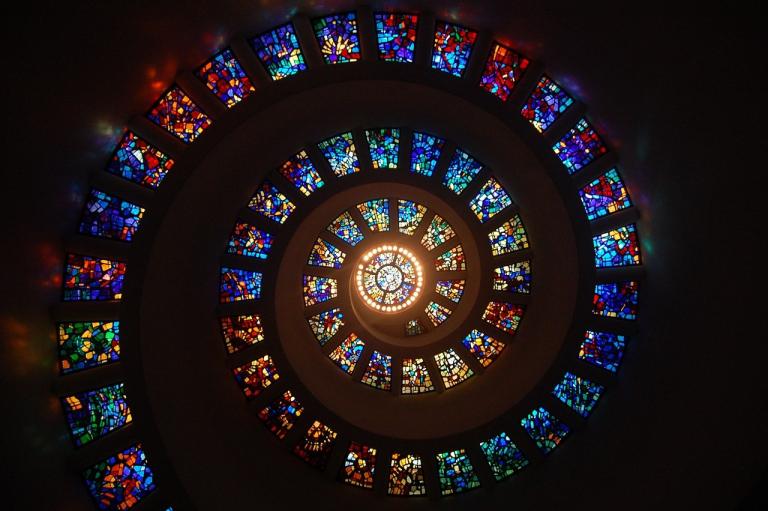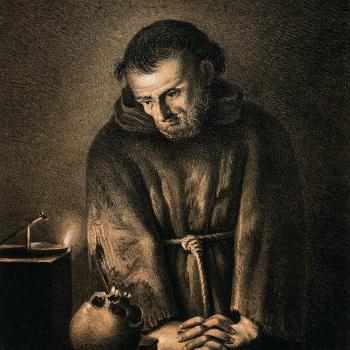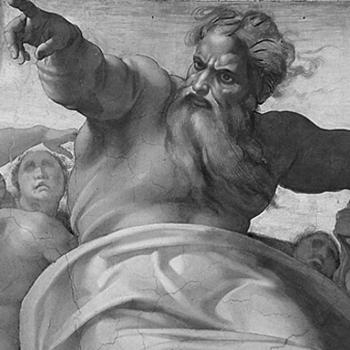A reader, who chooses to remain anonymous, posed the following question:
“a world shaped by peace and harmony among the people of all positive paths.” Are they all the way or is there only one way?
The reader is quoting me from an article posted on my website, The Hidden Tradition of Christian Mysticism.
In short: are all religions one? Are all spiritual paths simply different expressions of the “one path” — or is there, in fact, only “one” way?
It’s a great question, and I am only qualified to offer my own thoughts. But I believe the perspective I present here is a common one among contemplatives, not only of Christianity but of all positive/healthy spiritual paths.
First, a bit of background. I grew up in a middle-class, mostly white, suburban Lutheran congregation. I suppose like many young people in Christian settings, I learned — among other things — that Jesus Christ is the only way to God.
Indeed, verse 14:6 of the Gospel of John quotes Jesus as bluntly saying:
I am the way, and the truth, and the life. No one comes to the Father except through me.
If we take this literally, doesn’t it seem to be saying that Jesus is the only way to God? That’s certainly what I was taught.
There’s only one problem here. In High School I had friends who were Jewish and Hindu. By the time I got to college and graduate school, I could add Buddhists and Muslims to my list of friends — and then I would meet Wiccans, practitioners of indigenous and primal spiritualities, and so forth. If I read John 14:6 literally, I am basically left with a world-view that says none of these friends will “come to the Father.”
This has created quite the existential problem for Christians, especially those who live in a pluralistic society — like most of the world today.

How Christians Deal with John 14:6
Generally speaking, it seems that Christians have dealt with this problem in one of three ways:
- They choose to take John 14:6 literally, and do everything they can to get their non-Christian friends and neighbors to become Christian. This often backfires, and leaves the non-Christians annoyed or angered, giving them a bad taste in their mouth about Jesus. And it leaves the Christian facing the idea that all the non-Christian people they genuinely love and care about are cut off from God, because they (the Christian) failed to effectively evangelize these folks. And, since there is a long tradition in Christianity that equates “being cut off from God” with “spending an eternity in the conscious torments of hell”, this scenario is frankly rather terrifying.
- Because of the problems behind door #1, many people from Christian backgrounds experience a crisis of faith. If part of the “requirement” of being a Christian is believing that non-Christians are going to hell, that’s enough of a sticking point to cause some people — maybe many people — to give up on Christianity. “Why should I worship a God,” they reason, “who is so vicious as to condemn the vast majority of his own creation to an eternity of torment, simply because they were born into the wrong religion?” In other words, a person is born into a Buddhist or Muslim or Jewish or Hindu (or whatever) family, conscientiously observes the religion of their upbringing, lives as good and moral a life as they can, but then they die and are told “Sorry, you didn’t follow Jesus, so off to the lake of fire you go!” Many people just say “no thanks” and either give up on spirituality altogether or become “spiritually independent” or “spiritual but not religious.” It’s important for Christians to understand that these people are not just lazy or rebellious — they are making a moral choice by rejecting an image of God that they see as abusive and hostile to the cultural diversity on planet earth.
- The third option some Christians take: to adopt a live and let live approach to people who follow different faiths. They see making the effort to live a good and virtuous life as ultimately mattering more than what religion you belong to. If they were pressed on the question of John 14:6, they would argue that it’s just an outdated concept in the Bible, similar to how the Bible insists that women should obey their husbands or that slaves should submit to their masters. Even if they believe the Bible is the inspired word of God, they don’t insist that every single verse carries the same weight, and that some of the verses — even when attributed to the mouth of Jesus himself — need to be understood as metaphorical or symbolic language. These Christians are willing to criticize their faith (including how the Bible is interpreted), but they still value being in a spiritual community so they don’t reject Christianity altogether.
Now, let’s go back to the reader’s question: are all paths the way, or is there only one way? I think you can only answer this question once you have decided how you understand God. If you think about it, each of the three bullet points above is based on a different image of God, which is to say, a different way of understanding who God is, and how God operates in the world.
- The first option: based on taking passages like John 14:6 literally — sees God as embodying a set of rules, and unyielding in his objective application of these rules. This image of God sees obedience to law as mattering more than relationships and bonds of love — everything simply depends on conformity (or lack thereof) to some objective standard. Either you come to God through Jesus, or you don’t. It’s very black-or-white. This image of God appeals to a personality type that requires a very concrete, structured way of seeing God and the universe.
- The second option prefers a God who is loving and relationship-centered, but perhaps is rather individualistic. This God doesn’t care about rules and regulations, and can’t be bothered with any community or social structure, especially if it impinges on a person’s individual rights. This God says “you do your thing, and I’ll do mine, and we can get together as long as it’s convenient for both of us.” This God-image has a good heart, but perhaps is not very patient with the messy work of building or sustaining community.
- The third option is, once again, a God who prioritizes love, but not by rejecting law. This God-image still values social and communal engagement, even if it means living with the tension of some ideas or principles that seem to be in conflict. This image of God is more comfortable with paradox and ambiguity. It values both relationship and individuality and tries to hold both of these values together, even though that may cause some unresolvable tension. This God-image does not reject law, but tries to balance rules and relationship in a creative way.
Granted, these are over simplifications. But for the purposes of answering my reader’s question:
- People who prefer the first image of God — the God who prioritizes rules and law over relationships and love — are more likely to believe that there is only one way (and all other “ways” are erroneous if not evil).
- People who prefer the second image of God — the God who prioritizes relationships and love over rules and law — are more likely to believe that “all paths are ‘the way'” or even that “all paths are one” (in practice this can mean refusing to follow any one path, since no one path is any better than any others).
- People who prefer the third image of God — that see God as holding love, relationships, law and rules in a creative tension — probably see value in all paths, but also have a sense that there is still one ultimate way or path.
The Spirituality of the “Ultimate” Path
In my experience, people who are serious about contemplative and mystical practice often will sooner or later find themselves embracing this third image of God. They value spiritual community (which may or may not look like the old models of institutional religion). But they also value the freedom of one’s conscience. They respect different religions and trust that a person can live a good and even virtuous life by following any positive/healthy spiritual path, but they also have fairly clear or nuanced ideas about what makes a path “positive” and “healthy”:
- A positive and healthy path is anchored in love, in compassion, in caring and kindness.
- A positive and healthy path promotes virtues, such as justice, humility, generosity and hospitality.
- A positive and healthy path acknowledges that no one is perfect and offers ways for people to repent, practice forgiveness, and work toward reconciliation.
- A positive and healthy path understands that we live in a diverse world where people look, think and act differently; difference in itself is not a bad thing.
- A positive and healthy path offers individuals ways to grow spirituality, through prayer, meditation, contemplation, and other meaningful spiritual practices.
- A positive and healthy path challenges individuals to become better people, by letting go of harmful or selfish behavior and embracing a higher, more “divine” consciousness.
- A positive and healthy path actively works to make the world a better place, by fighting injustice and oppression and systemic evils (such as poverty, racism or sexism).
Anyone who knows much about world religions knows that every path is a gloriously messy mixture of these kinds of positive/healthy qualities, but also more toxic or dysfunctional qualities: such as intolerance, prejudice, hostility to those who are different, judgmentalism, legalism, and spiritual chauvinism which leads to spiritual pride.
In other words, no one path is perfect — including Christianity (I write this as a practicing Christian). But every path that seeks to cultivate the above markers of positive/healthy spirituality, while imperfect, is still “on the right path.”
So, with this in mind, here’s my answer to the question: I believe in one path: the path of love, of compassion, of kindness and humility and holiness. I believe no one religion perfectly walks this path, but that many spiritual/religious traditions nevertheless do invite us to walk this “one path.” And since no one religion perfectly embodies the one path, I accept the fact that different paths exist. You could say there are “many paths but one way” — the way of love.
Now, a final word about John 14:6. Christians believe that Jesus is one with God, and that God is Love (see John 10:30 and I John 4:16). Therefore, to be a Christian means to believe that Jesus is one with Love. So look at John 14:6 this way:
Love is the way, the truth, and the life. No one comes to God except through Love.
In other words, we need to recognize a distinction between Jesus of Nazareth — the human being whom Christians celebrate as the Son of God, but other faiths do not see the same way — and what Richard Rohr calls The Universal Christ — that manifestation of God-is-Love that transcends all religious or cultural boundaries. It’s when we get caught up in reading John 14:6 from the limited perspective of Jesus of Nazareth that we get ourselves into trouble. But when we can read it from and through the eyes of Christ, one with God, one with Love: then the wisdom of this passage opens us up — not to legalism or religious exclusivism, but to an all-embracing compassion and mystical heart.
Enjoy reading this blog?
Click here to become a patron.














